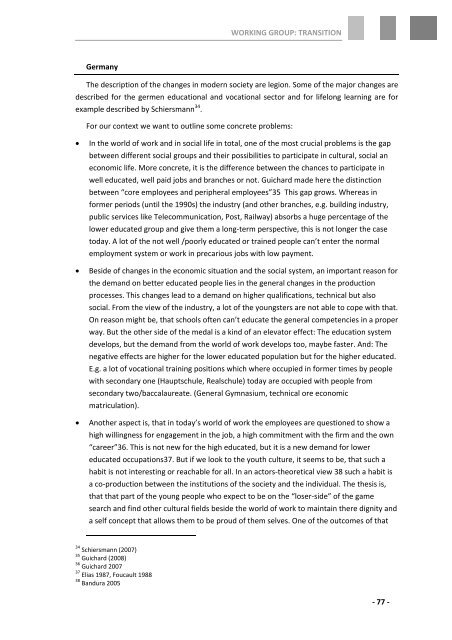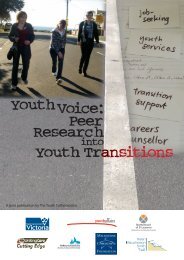Second Survey School and WOW.pdf
Second Survey School and WOW.pdf
Second Survey School and WOW.pdf
You also want an ePaper? Increase the reach of your titles
YUMPU automatically turns print PDFs into web optimized ePapers that Google loves.
WORKING GROUP: TRANSITION<br />
Germany<br />
The description of the changes in modern society are legion. Some of the major changes are<br />
described for the germen educational <strong>and</strong> vocational sector <strong>and</strong> for lifelong learning are for<br />
example described by Schiersmann 34 .<br />
For our context we want to outline some concrete problems:<br />
<br />
<br />
<br />
In the world of work <strong>and</strong> in social life in total, one of the most crucial problems is the gap<br />
between different social groups <strong>and</strong> their possibilities to participate in cultural, social an<br />
economic life. More concrete, it is the difference between the chances to participate in<br />
well educated, well paid jobs <strong>and</strong> branches or not. Guichard made here the distinction<br />
between “core employees <strong>and</strong> peripheral employees”35 This gap grows. Whereas in<br />
former periods (until the 1990s) the industry (<strong>and</strong> other branches, e.g. building industry,<br />
public services like Telecommunication, Post, Railway) absorbs a huge percentage of the<br />
lower educated group <strong>and</strong> give them a long‐term perspective, this is not longer the case<br />
today. A lot of the not well /poorly educated or trained people can’t enter the normal<br />
employment system or work in precarious jobs with low payment.<br />
Beside of changes in the economic situation <strong>and</strong> the social system, an important reason for<br />
the dem<strong>and</strong> on better educated people lies in the general changes in the production<br />
processes. This changes lead to a dem<strong>and</strong> on higher qualifications, technical but also<br />
social. From the view of the industry, a lot of the youngsters are not able to cope with that.<br />
On reason might be, that schools often can’t educate the general competencies in a proper<br />
way. But the other side of the medal is a kind of an elevator effect: The education system<br />
develops, but the dem<strong>and</strong> from the world of work develops too, maybe faster. And: The<br />
negative effects are higher for the lower educated population but for the higher educated.<br />
E.g. a lot of vocational training positions which where occupied in former times by people<br />
with secondary one (Hauptschule, Realschule) today are occupied with people from<br />
secondary two/baccalaureate. (General Gymnasium, technical ore economic<br />
matriculation).<br />
Another aspect is, that in today’s world of work the employees are questioned to show a<br />
high willingness for engagement in the job, a high commitment with the firm <strong>and</strong> the own<br />
“career”36. This is not new for the high educated, but it is a new dem<strong>and</strong> for lower<br />
educated occupations37. But if we look to the youth culture, it seems to be, that such a<br />
habit is not interesting or reachable for all. In an actors‐theoretical view 38 such a habit is<br />
a co‐production between the institutions of the society <strong>and</strong> the individual. The thesis is,<br />
that that part of the young people who expect to be on the “loser‐side” of the game<br />
search <strong>and</strong> find other cultural fields beside the world of work to maintain there dignity <strong>and</strong><br />
a self concept that allows them to be proud of them selves. One of the outcomes of that<br />
34 Schiersmann (2007)<br />
35 Guichard (2008)<br />
36 Guichard 2007<br />
37 Elias 1987, Foucault 1988<br />
38 B<strong>and</strong>ura 2005<br />
‐ 77 ‐




